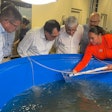
The U.S. Grains Council (USGC) took a prominent role in international energy discussions last week as Linda Schmid, USGC Manager of Ethanol Policy and Sustainability, attended the 15th Clean Energy Ministerial Meeting (CEM15) and the Ninth Ministerial Meeting of Mission Innovation (MI-9) in Foz do Iguaçu, Brazil. Schmid’s participation focused on promoting ethanol as a vital tool in the transition to carbon neutrality.
Held alongside the Fourth G20 Energy Transition Working Group Meeting (ETWG IV) and the G20 Energy Transition Ministerial Meeting (ETMM), the high-profile events centered on advancing climate-conscious solutions for the transportation sector. The discussions emphasized sustainable innovations like Sustainable Aviation Fuel (SAF) and other biofuel initiatives that are expected to play a key role in reducing global carbon emissions.
“Biofuels are playing a key role in decarbonizing road vehicles, air travel through SAF, and day-to-day living with initiatives like clean cooking,” Schmid said. “It’s up to all of us at the Council to continue to work collaboratively with our international partners and advance biofuel policies worldwide.”
Schmid noted that with Brazil set to host the COP30 United Nations Climate Conference next year, it was crucial for the U.S. biofuel industry to have a presence at the event to lay the groundwork for high-level discussions on biofuel adoption in 2025 and beyond.
SAF, in particular, has gained international traction in recent years as countries have announced blending targets, creating new market opportunities for U.S. biofuel producers. Schmid’s participation at the meetings included attending the Sustainable Fuels, Chemicals, and Materials Industry Forum, which brought together stakeholders to discuss industry priorities and policy commitments needed to support sustainable energy advancements.
“The Council strives to be an active participant in these discussions to have a direct understanding of how governments and the private sector are operating within the context of climate change,” Schmid said. “Encouraging and tracking developments in global adoption of SAF and clean cooking with biofuels will ultimately benefit the U.S. industry by generating significant demand across multiple avenues.”
The meetings, which drew energy and environmental leaders from around the world, set the stage for continued engagement and collaboration ahead of the upcoming COP30, where ethanol’s role in decarbonization is expected to be a key focus.
By advocating for biofuels at these international platforms, the USGC aims to solidify the global positioning of U.S. ethanol as a competitive, sustainable solution for meeting both energy and environmental goals.

















